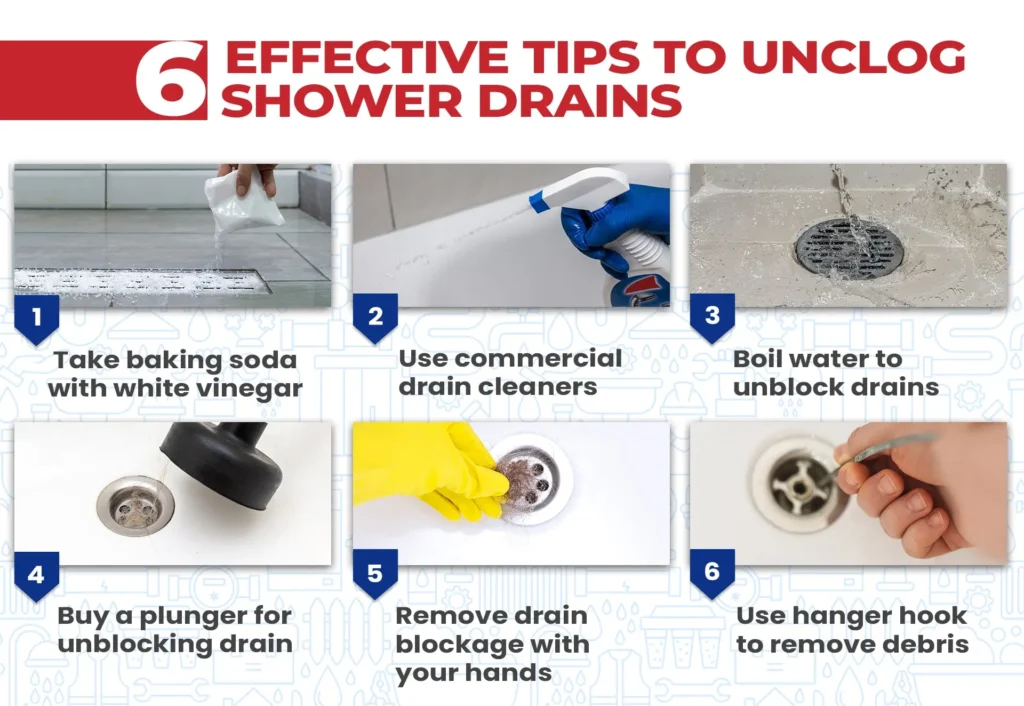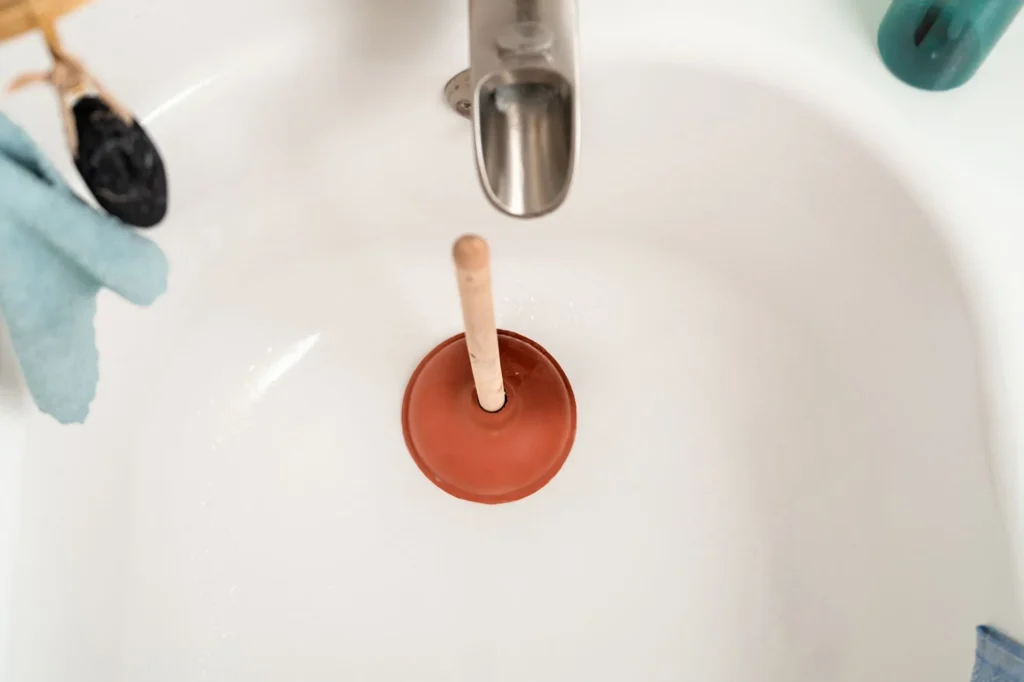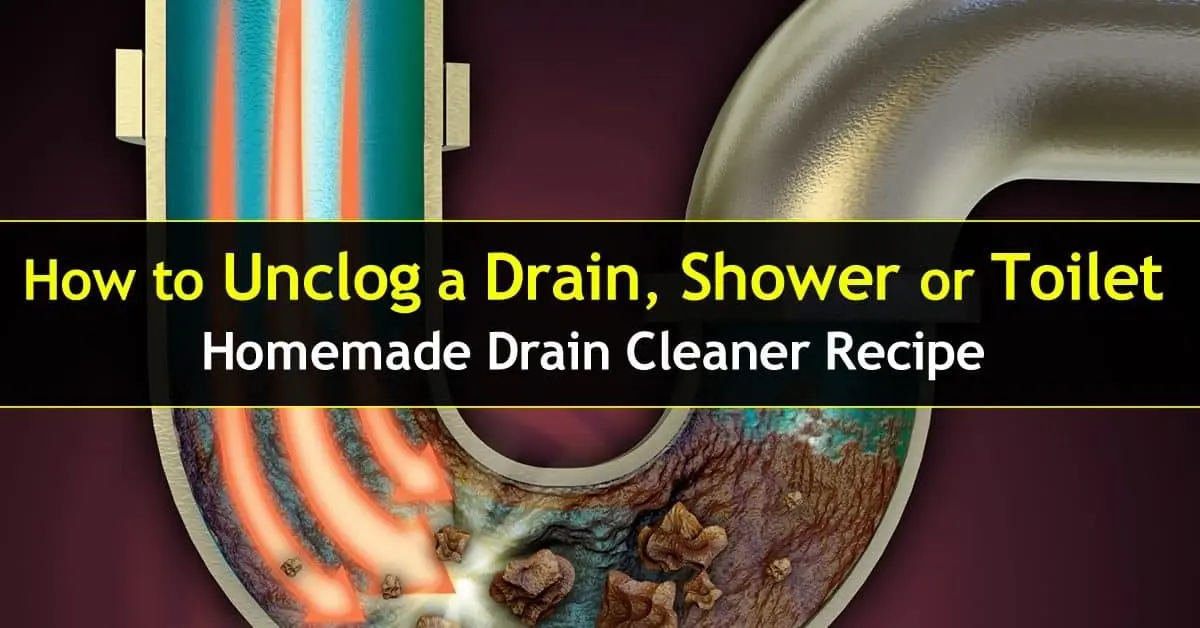By thehowtotips.com
Introduction:
How to Unclog Shower Drain: Is your shower backing up? The usual suspects—hair, soap scum, mineral buildup, and grime—cause slow drainage or blockages. This SEO‑optimized guide walks you through easy, proven DIY techniques to unclog your shower drain without needing a plumber.
Why Shower Drains Clog
- Hair & soap scum: the main culprits in most shower clogs
- Mineral deposits: common in hard‑water areas
- Debris: dirt, product residue or small objects
Tools & Supplies Required
- Rubber gloves & eye protection
- Flashlight
- Toilet/shower plunger
- Drain snake or auger
- Bent wire coat hanger or drain‑weasel tool
- Baking soda & white vinegar
- Boiling water (metal pipes only)
- Commercial enzyme cleaner (optional)
Step‑by‑Step Unclogging Guide
1. Prep & Inspect Drain
Unscrew or pop off the drain cover. Use a flashlight to locate the clog. Always put on gloves and goggles first.
2. Remove Visible Debris
Grab hair and gunk with fingers or needle‑nose pliers. For deeper buildup, use a bent coat hanger or a flexible drain‑weasel tool.
3. Flush with Boiling Water
Gently pour boiling water down metal pipes only to dissolve soap/mineral residue. Skip PVC to avoid damage.
4. Baking Soda & Vinegar Fizz
Pour 1 cup baking soda followed by 1 cup white vinegar. Let fizz for 20–30 minutes, then rinse with hot water :contentReference[oaicite:1]{index=1}. This natural method loosens organic build‑up and deodorizes the drain.
5. Plunge the Drain
Seal the plunger over the drain, fill enough water to submerge the cup, then plunge vigorously to loosen blockages.
6. Use a Drain Snake
Feed the snake or auger into the drain until it hits resistance, rotate to hook debris, then pull it out. Repeat until water flows freely :contentReference[oaicite:2]{index=2}.
7. Try Enzyme or Commercial Cleaner
If clearing is stubborn, try enzyme cleaners like Green Gobbler or Liquid‑Plumr. They digest organic material gently, safer than corrosive chemicals :contentReference[oaicite:3]{index=3}.
Prevention Tips
- Install and clean a drain strainer weekly
- Brush or comb hair before showering
- Flush metal pipes weekly with boiling water, PVC with hot tap water
- Do a monthly baking‑soda + vinegar flush
Troubleshooting Guide
| Problem | Solution |
|---|---|
| Water sits in drain | Repeat plunger or snake method |
| Persistent clog | Use enzyme cleaner or call plumber |
| Bad odor | Vinegar flush + enzyme cleaner |
External Resources & References
- HGTV: How to Unclog a Shower Drain – step‑by‑step natural methods and tool advice :contentReference[oaicite:4]{index=4}
- Liquid‑Plumr®: Baking Soda & Vinegar Guide – science‑based explanation and four‑step DIY breakdown :contentReference[oaicite:5]{index=5}
- Frontdoor: 5 Best Ways to Unclog Your Shower Drain – includes wet/dry vac tips :contentReference[oaicite:6]{index=6}
YouTube Tutorials
Conclusion
To unclog your shower drain: clear visible debris, flush with boiling water, apply baking‑soda + vinegar, plunge, snake, or use an enzyme cleaner. Weekly upkeep and monthly DIY flushes prevent future backups. Most clogs are easily manageable with these steps.
FAQs (Frequently Asked Questions)
Q1: Is baking soda & vinegar safe? A: Yes for mild clogs—it’s eco‑friendly and non‑caustic. But avoid for stubborn blockages or older pipes, as salt byproducts may corrode :contentReference[oaicite:7]{index=7}. Q2: Can I pour boiling water into PVC drains? A: No—PVC can warp under high heat. Use hot tap water instead. Q3: What remedies work best for hair buildup? A: Mechanical removal (snake or molded wire hook) and enzyme cleaners are most effective without risking pipe damage :contentReference[oaicite:8]{index=8}. Q4: When should I call a plumber? A: After multiple DIY attempts fail, or if water backs up in multiple fixtures or pipe damage is suspected. Q5: How often should I clean my drain? A: Weekly strainer cleaning plus a monthly baking‑soda + vinegar flush keeps drains flowing and odor‑free.
Enjoy clog-free showers! For more DIY home repair and cleaning guides, visit thehowtotips.com.



